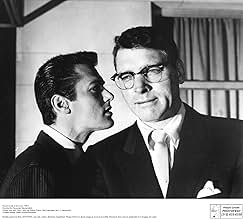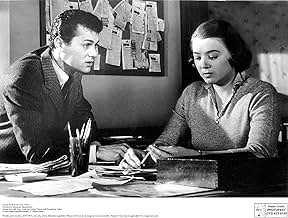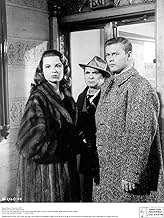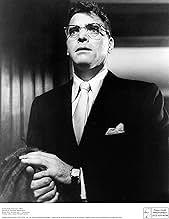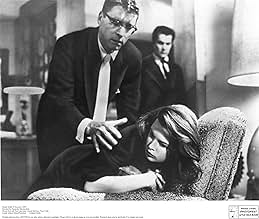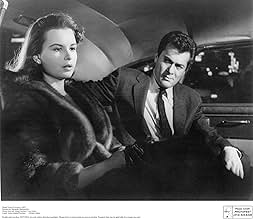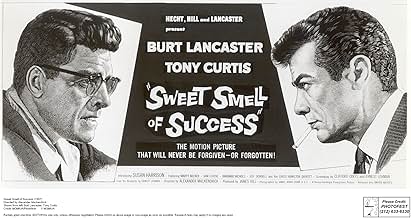NOTE IMDb
8,0/10
38 k
MA NOTE
Le chroniqueur puissant, mais contraire à l'éthique de Broadway J.J. Hunsecker contraint l'agent de presse sans scrupules Sidney Falco à rompre la romance de sa soeur avec un musicien de jaz... Tout lireLe chroniqueur puissant, mais contraire à l'éthique de Broadway J.J. Hunsecker contraint l'agent de presse sans scrupules Sidney Falco à rompre la romance de sa soeur avec un musicien de jazz.Le chroniqueur puissant, mais contraire à l'éthique de Broadway J.J. Hunsecker contraint l'agent de presse sans scrupules Sidney Falco à rompre la romance de sa soeur avec un musicien de jazz.
- Réalisation
- Scénario
- Casting principal
- Nomination aux 1 BAFTA Award
- 3 victoires et 3 nominations au total
Martin Milner
- Steve Dallas
- (as Marty Milner)
Chico Hamilton
- Self
- (as The Chico Hamilton Quintet)
Buddy Clark
- Self
- (as The Chico Hamilton Quintet)
Jay Adler
- Manny Davis
- (non crédité)
Mary Bayless
- Bar Patron
- (non crédité)
Nicky Blair
- Patron at Toots Shor's
- (non crédité)
Nick Borgani
- Waiter
- (non crédité)
Avis à la une
The fact that in 1957 this film was made at all is proof that Walter Winchell's decline was already setting in. Burt Lancaster's J.J. Hunsecker based on Winchell and very frightening accurately portrays the columnist and the power he wielded.
For those who are interested in how Winchell got to where he was J.J. Hunsecker I would recommend Neal Gabler's biography of him which came out a few years ago. Sweet Smell of Success is the story of a day in the life of this monster who everyone on the planet it seems is terrified of offending. Like Winchell at the Stork Club, Hunsecker holds court like some monarch at a nightclub where people are obsequiously asking for some recognition in his column.
One of these is Sidney Falco, press agent and bootlicking dog extraordinaire. Hunsecker is mad at him because he sent him on an errand to break up a romance his younger sister is having with a jazz musician he doesn't approve of. The film is essentially Falco's attempts to carry out his master's wishes.
Burt Lancaster had already received critical acclaim as an actor, but this was a breakthrough role for Tony Curtis as Sidney Falco. Up to then Curtis was the handsome romantic lead in many lightweight films for his home studio of Universal. Sidney Falco was a lot of things, but heroic wasn't one of them. Next year Tony Curtis would get an Oscar nomination for The Defiant Ones. How Lancaster and Curtis were ignored by the Academy for nominations is beyond me.
The young lovers are Susan Harrison and Martin Milner. This was probably Marty Milner's finest screen role. As Lancaster was also the producer he personally cast Milner in the part having worked with him on Gunfight at the OK Corral. Susan Harrison strangely enough never had much of a career after a promising debut. She ultimately wreaks a terrible vengeance on one of our protagonists.
One of the ironic lines in the film is Lancaster saying that he'd fold up if he had to exist on a press agent's tidbits. But ironically that's how Winchell/Hunsecker did exist. Winchell had no real skill as a reporter as Gabler's biography pointed out. When the tidbits stopped, he dried up and blew away.
Sweet Smell of Success was a commercial flop, movie audiences did not take to the offbeat casting of the leads nor to the gritty realistic story. Today the film is a deserved classic.
For those who are interested in how Winchell got to where he was J.J. Hunsecker I would recommend Neal Gabler's biography of him which came out a few years ago. Sweet Smell of Success is the story of a day in the life of this monster who everyone on the planet it seems is terrified of offending. Like Winchell at the Stork Club, Hunsecker holds court like some monarch at a nightclub where people are obsequiously asking for some recognition in his column.
One of these is Sidney Falco, press agent and bootlicking dog extraordinaire. Hunsecker is mad at him because he sent him on an errand to break up a romance his younger sister is having with a jazz musician he doesn't approve of. The film is essentially Falco's attempts to carry out his master's wishes.
Burt Lancaster had already received critical acclaim as an actor, but this was a breakthrough role for Tony Curtis as Sidney Falco. Up to then Curtis was the handsome romantic lead in many lightweight films for his home studio of Universal. Sidney Falco was a lot of things, but heroic wasn't one of them. Next year Tony Curtis would get an Oscar nomination for The Defiant Ones. How Lancaster and Curtis were ignored by the Academy for nominations is beyond me.
The young lovers are Susan Harrison and Martin Milner. This was probably Marty Milner's finest screen role. As Lancaster was also the producer he personally cast Milner in the part having worked with him on Gunfight at the OK Corral. Susan Harrison strangely enough never had much of a career after a promising debut. She ultimately wreaks a terrible vengeance on one of our protagonists.
One of the ironic lines in the film is Lancaster saying that he'd fold up if he had to exist on a press agent's tidbits. But ironically that's how Winchell/Hunsecker did exist. Winchell had no real skill as a reporter as Gabler's biography pointed out. When the tidbits stopped, he dried up and blew away.
Sweet Smell of Success was a commercial flop, movie audiences did not take to the offbeat casting of the leads nor to the gritty realistic story. Today the film is a deserved classic.
Tony Curtis learns the hard way about the "Sweet Smell of Success" in this 1957 film that stars Burt Lancaster, Sam Levene, Susan Harrison, and Barbara Nichols. In the pre-Internet days when the newspaper was king, the columnists ruled - Winchell, Ed Sullivan, Cholly Knickerbocker, Radie Harris, and let's not forget Hedda and Louella! But the King was Winchell, and while I don't think the Burt Lancaster character of J.J. Hunsecker is modeled on him, the power and control the man wielded certainly is.
Tony Curtis plays one of his best roles as Sidney Falco, a low-ranking press agent who is dependent on people like Hunsecker to mention his clients in their daily columns. But Sidney is on the outs with Hunsecker, a very bad place to be. Hunsecker has ordered Sidney to break up his sister Susan's relationship with a jazz musician, Steve (Martin Milner), and Susan is still seeing him. Sidney comes up with a plan to tear the two apart which probably would have worked, but when Steve stands up to J.J., Hunsecker is out for blood. He demands the plan be taken one step further and dangles an attractive carrot in front of Sidney to make it happen.
Done in black and white with most of the action taking place at night and often on the streets of Times Square, "The Sweet Smell of Success" has an atmosphere of slime and grit. The handsome Lancaster and Curtis are not particularly well photographed - it's not meant to be a glamorous picture. The dialogue is fast, to the point, and witty and the performances are breathtaking. Lancaster underplays the twisted Hunsecker so that his contempt for the people he writes about - and his sick attraction to his sister - can be clearly shown. He could have played it more along the lines of Curtis' Sidney - an obvious, manipulative rat - but it wouldn't have been as right as Lancaster's tightly-controlled J.J.
Curtis was born to play Sidney - an attractive, fast-talking man with no morals who plays both ends against the middle. He's a New York character, ideal for a New York guy like Curtis who grew up on the streets. Sidney is totally outrageous - he invites a cigarette girl to his apartment and then pimps her out to a columnist so he can get an item in his column; he tries blackmailing another columnist, but that backfires. It doesn't stop him from trying again.
The two victims of these piranhas are Susan and Steve, a young couple deeply in love who want to be married. Their simple story is told against a backdrop of scandal, revenge, manipulation and blackmail. Their situation makes the actions of J.J. and Sidney even seedier and more cruel than they already are.
"Sweet Smell of Success" has become a cult classic and was actually mounted at one point as a Broadway musical. Like "Nightmare Alley," it probably was too grim for audiences back then. Is anything too grim for audiences of today? Doubtful.
Tony Curtis plays one of his best roles as Sidney Falco, a low-ranking press agent who is dependent on people like Hunsecker to mention his clients in their daily columns. But Sidney is on the outs with Hunsecker, a very bad place to be. Hunsecker has ordered Sidney to break up his sister Susan's relationship with a jazz musician, Steve (Martin Milner), and Susan is still seeing him. Sidney comes up with a plan to tear the two apart which probably would have worked, but when Steve stands up to J.J., Hunsecker is out for blood. He demands the plan be taken one step further and dangles an attractive carrot in front of Sidney to make it happen.
Done in black and white with most of the action taking place at night and often on the streets of Times Square, "The Sweet Smell of Success" has an atmosphere of slime and grit. The handsome Lancaster and Curtis are not particularly well photographed - it's not meant to be a glamorous picture. The dialogue is fast, to the point, and witty and the performances are breathtaking. Lancaster underplays the twisted Hunsecker so that his contempt for the people he writes about - and his sick attraction to his sister - can be clearly shown. He could have played it more along the lines of Curtis' Sidney - an obvious, manipulative rat - but it wouldn't have been as right as Lancaster's tightly-controlled J.J.
Curtis was born to play Sidney - an attractive, fast-talking man with no morals who plays both ends against the middle. He's a New York character, ideal for a New York guy like Curtis who grew up on the streets. Sidney is totally outrageous - he invites a cigarette girl to his apartment and then pimps her out to a columnist so he can get an item in his column; he tries blackmailing another columnist, but that backfires. It doesn't stop him from trying again.
The two victims of these piranhas are Susan and Steve, a young couple deeply in love who want to be married. Their simple story is told against a backdrop of scandal, revenge, manipulation and blackmail. Their situation makes the actions of J.J. and Sidney even seedier and more cruel than they already are.
"Sweet Smell of Success" has become a cult classic and was actually mounted at one point as a Broadway musical. Like "Nightmare Alley," it probably was too grim for audiences back then. Is anything too grim for audiences of today? Doubtful.
Press freedom is one of the best thing in any democratic society but it may sometimes produce/bring lies used for the advantage of powerful groups and/or circles. That is why this film was called in some Latin American countries "A Damn Lie". The excellent plot shows how someone arrogant, selfish, good writing and talking as J.J. Hunsecker (Burt Lancaster) was able to use various factors in the society he did his work in order to destroy any enemy, any adversary or any person whom he did not like at all. An example was the boy friend of his sister Susan, a working young man, devoted to music and strongly in love with Susan, completely discredited by JJ. Certainly JJ was a kind of a sick man, unable to accept any reason from any other person. He was born to have adversaries and not friends. To do all his work JJ needed snakes (not persons) as Sidney Falco (Tony Curtis), who behaved worse than a reptile, always praising JJ although he in fact hated him and creating the intrigues whenever there were necessary. Very good film and probably a lesson, the acting was also excellent, particularly of Lancaster as a tough columnist JJ and Tony Curtis as a low ethic man.
10twm-2
**MILD SPOILERS** It is amazing the number of different ways a great film can weave its alluring web and pull you into its story. Of my 100 favorite films, this one's journey into that rarefied status is unique, based on but a single viewing. I saw "Sweet Smell of Success" when I was too young to really grasp the subterranean motivations of the characters who so vividly populate the film. I did not understand, for instance, why this powerful, loathsome gossip columnist, Burt Lancaster's JJ Hunsecker, who so clearly despised Tony Curtis' Sidney Falco (press agent), nonetheless tolerated his presence. There was much that I DID appreciate--the brilliant and daring acting of the two leads, the beautifully oppressive cinematography, and the scintillating dialogue--but after that single viewing, the film slowly faded from my consciousness. Twenty-five or 30 years later, I decided to make a list of my favorite movies, and came across the title of this film. Apparently, memories of seeing this production had been roiling around my unconscious all this time and now, triggered by the little blurb in the Leonard Maltin book, these half-forgotten images came bounding back into mind, now concatenated with a quarter century of life and movie-going experience. Honing my list over the next few months, and considering this film's merits, I more and more began to realize what a truly marvelous work this was. This was a study nonpareil of two creatures wholly wrapped up in themselves and their ambition, yet bound together in a mutual parasitism (the term symbiosis sounds much too nice to describe their relationship). I understood, finally, why JJ tolerated Falco's presence. He NEEDED Falco. It wasn't just that Falco would occasionally offer up tidbits that he could use in his column. It wasn't that the fawning Falco could be manipulated into performing certain . . . Uh, tasks that were too dirty for JJ to touch. No, as a ruthless power-monger, he needed the treacherous sycophant as a constant reminder and test of his superiority. Falco could be demeaned and ridiculed, but he also represented a danger, a challenge. Falco might seem a toady, but he was also a cobra waiting his chance to strike, and Hunsecker relished his role as sadistic snake charmer. Watching these two play at their oppressive games of perfidy, and dealing dirt, provide a fascinating character study perhaps the equal of the more famous examination of one Charles Foster Kane in an earlier film. There are many other characters in the movie, such as JJ's sister and her lover, and some are played with great aplomb, but they are all pawns in this disdainful dance between JJ and Falco, and it is their personalities that stay with you long after the lights come back on.
Everything about this movie seems to be nearly perfect (some have criticised the film for the relatively weak portrayal of the two hapless lovers, but a stronger emphasis on these two would only detract from the real focus--JJ and Sidney) even to the choice of names. JJ Hunsecker and Sidney Falco seem perfect monikers, by themselves conjuring up images of loathsome characters. Unfortunately, for the team that put together this masterpiece of film-noir, "Sweet Smell of Success" was no success, and critics and movie-goers alike left the theaters convinced that the "smell" generated by the film was far from sweet. Amazingly, this film not only failed to garner an Oscar, it failed to receive a single solitary nomination--not for Alexander Mackendrick's direction (this abject failure truncating his promising career), not for the incisive, endlessly quotable screenplay (Ernest Lehman & Clifford Odets), not Elmer Bernstein's wonderful score, nor the tremendous performances of Curtis and Lancaster--not even James Wong Howe's gritty cinematography, beautifully capturing the seamier side of New York City. Fortunately, history has stepped in to provide a more accurate critique of this once ignored masterpiece. I can hardly wait to see it a second time.
Everything about this movie seems to be nearly perfect (some have criticised the film for the relatively weak portrayal of the two hapless lovers, but a stronger emphasis on these two would only detract from the real focus--JJ and Sidney) even to the choice of names. JJ Hunsecker and Sidney Falco seem perfect monikers, by themselves conjuring up images of loathsome characters. Unfortunately, for the team that put together this masterpiece of film-noir, "Sweet Smell of Success" was no success, and critics and movie-goers alike left the theaters convinced that the "smell" generated by the film was far from sweet. Amazingly, this film not only failed to garner an Oscar, it failed to receive a single solitary nomination--not for Alexander Mackendrick's direction (this abject failure truncating his promising career), not for the incisive, endlessly quotable screenplay (Ernest Lehman & Clifford Odets), not Elmer Bernstein's wonderful score, nor the tremendous performances of Curtis and Lancaster--not even James Wong Howe's gritty cinematography, beautifully capturing the seamier side of New York City. Fortunately, history has stepped in to provide a more accurate critique of this once ignored masterpiece. I can hardly wait to see it a second time.
From the opening credits to the climatic ending, the scintillating dialogue and the magnetic performances from both Burt Lancaster and Tony Curtis this is Hollywood at its cerebral best. The king of the thinking mans cinema. Has better dialogue ever been written, the meetings between all the different characters that inhabit this world of shadows and intrigue, constantly draw the viewers attention to this masterpiece. When the so called film buffs compile there lists of the "best" films and so on, this should always be talked of in the top five and yet though recognised more as the years go by this is still a highly overlooked film. That Marlon Brando, De niro, Nicholson and the like should be recognised so often in said lists when Burt Lancaster in this film and in so many others has equalled or surpassed there best performances is a real scandal. Perhaps because this film strikes at the very heart of the establishment and shows the media and press up for the unscrupulous scum they are that this is one those fellows would like to forget. It is always difficult to look the truth of oneself in the mirror and this is one mirror the media should look very closely at. A masterpiece from Lancaster, who's courage never failed when making films and was always ready to tackle the kind of film making that lesser men would not have dared to, not to mention casting himself in a "bad guy" role that defied his heroic, handsome leading man status. Let us not forget that this is the same man who through out his life was never afraid to speak out on subjects that were important to him, a life long liberal and contemptuous of anyone who excepted limitation. I love this film and both Lancaster and the picture were far ahead of their time.
Le saviez-vous
- AnecdotesPublicity materials for the film noted cinematographer James Wong Howe spread a film of Vaseline on Lancaster's glasses to create a shine and make his stare more menacing.
- Gaffes(at around 2 mins) When Sidney peruses J.J. Hunsecker's 'The Eyes of Broadway' column on page 21 of the New York Globe newspaper, it can be seen that several of the paragraphs are repeated. Of the nine paragraphs visible, it can be seen that paragraph 7 is an exact copy of paragraph 2; 8 is a copy of 5, and 9 is a copy of 4.
- Citations
J.J. Hunsecker: I'd hate to take a bite outta you. You're a cookie full of arsenic.
- Crédits fousintroducing Susan Harrison
- ConnexionsFeatured in Mackendrick: The Man Who Walked Away (1986)
Meilleurs choix
Connectez-vous pour évaluer et suivre la liste de favoris afin de recevoir des recommandations personnalisées
- How long is Sweet Smell of Success?Alimenté par Alexa
Détails
- Date de sortie
- Pays d’origine
- Langues
- Aussi connu sous le nom de
- La mentira maldita
- Lieux de tournage
- Sociétés de production
- Voir plus de crédits d'entreprise sur IMDbPro
Box-office
- Budget
- 3 400 000 $US (estimé)
- Montant brut mondial
- 8 025 $US
- Durée1 heure 36 minutes
- Couleur
- Rapport de forme
- 1.66 : 1(original ratio)
Contribuer à cette page
Suggérer une modification ou ajouter du contenu manquant

Lacune principale
By what name was Le Grand Chantage (1957) officially released in India in Hindi?
Répondre

